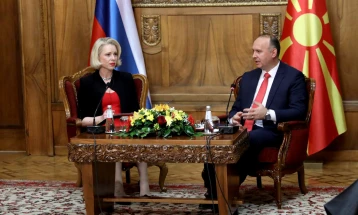Trump announces sweeping tariffs, hits EU with 20% duty
- US President Donald Trump on Wednesday announced a round of sweeping "reciprocal tariffs" on countries around the world.

Washington, 3 April 2025 (dpa/MIA) - US President Donald Trump on Wednesday announced a round of sweeping "reciprocal tariffs" on countries around the world.
Trump announced blanket tariffs of 10% on most US imports, with higher penalties based on trade deficits. Imports from the European Union will face a 20% tariff.
"We will charge them approximately half what they are or have been charging us," Trump said, speaking from the Rose Garden at the White House.
The president the move was aimed at countries that, in Washington's view, impose particularly high trade barriers on US products.
"They're ripping us off. It's so sad to see," Trump said, referring to the Europeans.
Branding April 2 "Liberation Day," he said the tariffs were designed to "get money back" for the US and strengthen its economy.
"This is one of the most important days, in my opinion, in American history. It is our declaration of economic independence. Now it is our turn to prosper," he added.
The 10% tariff was set to take effect on Saturday, while the higher rates would be enforced starting on April 9.
Trump said the US was "standing up for the American worker" with these new steps.
"Our country and its tax payers have been ripped off for 50 years but it is not going to happen anymore," Trump added.
Japan will be subject to import tariffs of 24%, while China's rate was set to be 34%.
Trump frequently lashes out at the European Union over the balance of trade, especially given the higher volume of European goods sold in the US compared to US exports to the bloc. The EU is, however, a net importer of US services.
Global leaders react to Trump's tariffs announcement
Italy's right-wing Prime Minister Giorgia Meloni criticized the new tariffs, calling them a "wrong" measure that benefits neither the US nor Europe.
In a Facebook post, Meloni said her government would work to reach an agreement with the US to prevent escalating tensions that could weaken the West against global competitors.
She also stated that Italy would coordinate with European partners to protect its economic interests.
Meloni, who has previously warned of a possible trade war, is seen as Trump's key European ally. She has positioned herself as a mediator between Washington and Brussels in the past.
Polish Prime Minister Donald Tusk called for "truly reciprocal tariffs."
"Friendship means partnership. Partnership means really and truly reciprocal tariffs. Adequate decisions are needed," Tusk wrote on social media platform X.
Australian Prime Minister Anthony Albanese said Trump's "unilateral action" was not surprising.
"For Australia these tariffs are not unexpected, but let me be clear: they are totally unwarranted," Albanese said, countering Trump's claim that the tariffs were reciprocal: "A reciprocal tariff would be zero, not 10%."
Albanese went on to say that the new tariffs "have no basis in logic and they go against the basis of our two nation's partnership. This is not the act of a friend."
The Australian premier said that the tariffs would hurt Americans the most, as he explained that Australia would not reciprocate but would dispute the measures.
"We will not join a race to the bottom that leads to higher prices and slower growth," Albanese said.
Trump heralds new 'golden era'
Trump claimed that the US was entering a new "golden era."
The imposition of reciprocal tariffs means, in principle, that the US will raise its tariffs in proportion to where they currently charge less than their trading partners.
Since moving back into the White House, Trump has been relying on tariffs on a large scale, as he also did in his first term in office.
He has already imposed tariffs on all aluminium and steel imports, introduced tariffs of 25% on imported cars and car parts, introduced increased tariffs on all goods from China and is targeting its neighbours Canada and Mexico.
The car tariffs in particular are hitting Europe and the German market hard.
Tariffs have consequences for consumers
An import duty works similarly to a tax. It has to be paid by the importing company – in this case, by companies in the US.
It is likely that the importing companies will not simply absorb the higher costs themselves. They are likely to pass them on to consumers, causing prices to rise and potentially fuelling inflation.
Trump's goal is to prevent US companies from importing products from abroad. In the long term, this should promote the US as a production location.
Trump claimed that a number of key US and foreign companies have pledged to build new factories in the United States in the coming years. He promised a total of $6 trillion in investment in factories in the US.
Counter-tariffs are expected and exporting companies are likely to suffer a decline in sales, which could lead to a decline in production and possible job cuts, which in turn can put a strain on the economy as a whole.
Photo: epa











